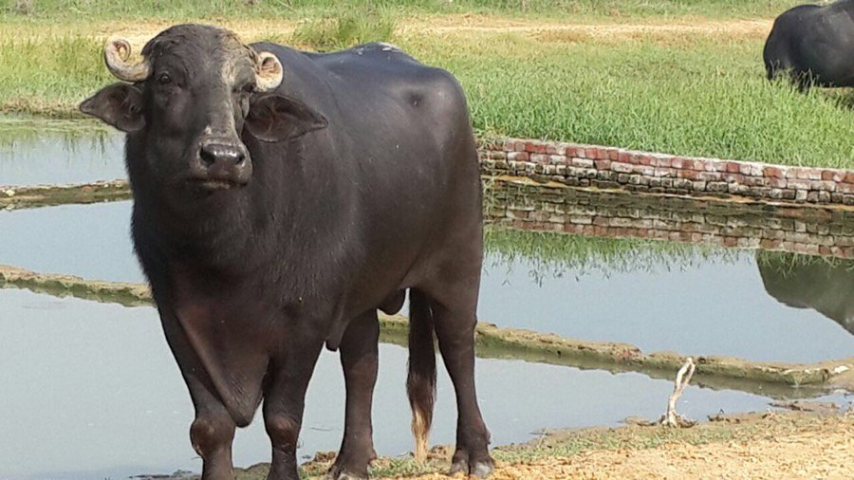

India is exporting Murrah buffalos to Nepal to inclrease its milk yields
Kathmandu: Critics of Nepal’s Prime Minister Pushpa Kamal Dahal are only his “buffalo deal” with India, sidestepping several other agreements that were inked during his pathbreaking visit to New Delhi from May 31-June 3.
However, the “buffalo deal” is not insignificant, but is significant for bolstering Nepal’s food security. Following the Nepal PM’s visit, India has notified Nepal that it would supply 15 high quality Murrah buffaloes from Nepal for breeding purposes.
In response to the opposition’s jibe that Dahal came back from India “riding on a buffalo,” Nepal’s Ministry of Agriculture and Livestock Development quickly revealed that India had agreed to supply those buffaloes after several years following Nepal’s request.
According to the ministry’s statement, Nepal had requested India for supply of 30 Murrah male buffaloes in 2018 during the meeting of Nepal India Joint Agriculture Working Group and in 2020, Nepal had formally requested India’s Ministry of Animal Husbandry.
As per New Delhi’s commitment to provide 15 such buffaloes, the southern neighbour agreed to supply them shortly during Prime Minister Dahal’s visit, the ministry said.
The ministry also highlighted the importance of these buffaloes whose semen would be used to breed more buffaloes that would give increased quantities of milk. “There is a plan to produce 150,000 doses of semen annually from these 15 buffaloes and conduct artificial insemination on 100,000 female buffaloes in the next three years contributing to boost milk production,” the ministry added.
Now the Nepali officials are awaiting a call from the India official to take delivery of buffaloes. “We have already decided on a team that would go to India to receive the buffaloes,” Chandra Dhakal, senior livestock development officer at the Department of Livestock Service (DLS) told India Narrative. “A four-member team of Nepali officials headed by our department’s director general will visit India to receive the buffaloes.”
According to him, the Indian side has also already notified that these buffaloes would be delivered through Rupaidiha -Nepalgunj border point in western Nepal. The Indian Council of Agriculture Research will deliver the buffalos, he said.
It is not that Nepal does not have Murrah buffaloes of its own. “What we are trying to do is to get a supply of male Murrah buffaloes born from the mother buffalo which are giving the highest quantity of milk,” said Dhakal.
According to the DLS, Nepal’s local breed of buffaloes give an average of 850 litres of milk per year. A cross-bred Murrah buffaloes ( buffaloes born from cross breeding of local buffaloes from Murrah) give around 1,500 litres a year. “Currently available pure Murrah breeds in Nepal have given as much as 2,300 litres per year,” said Dhakal.
The DLS has been using the male Murrah buffaloes born from mother Murrah with high milk productivity to produce semen.
“Now India is supplying the male buffaloes born from mother buffaloes which produce over 4,000 litres of milk in a year,” said Dhakal. “Their arrivals will help increase the population of buffaloes which can give more milk than currently available pure Murrah buffaloes in Nepal.”
According to the DLS, Nepal has a population of around 5.2 million buffaloes and 35 percent of them are pure Murrah and their cross-bred buffaloes. After bringing 15 male buffaloes from India, the Nepal government aims to distribute them to three National Livestock Breeding Centres located at eastern Lahan and western Pokhara and Nepalgunj cities.
Jagadish Pandeya, chief of National Livestock Breeding Centre at Pokhara told the India Narrative that his office was ready to welcome the buffaloes gifted by India.
“We have all the facilities available here to keep them,” Pandeya said. “We have certain standard procedures to house the newly brought livestock from abroad.”
According to him, the imported buffaloes bought for breeding purposes are first kept at a quarantine shed for 21 days and they are put on trails to familiarise them for semen production process. “After ensuring the quality of the semen, they are distributed to the farmers via livestock technicians,” he said.
The Pokhara-based breeding centre already has 12 male Murrah buffaloes whose semen is being collected and distributed to inseminate the farmers’ buffaloes. It is also keeping around 200 female Murrah buffaloes at the breeding centre to reproduce more Murrah buffaloes.
Nepali officials said that these breeding centres produce semen once or twice a week. “A male buffalo can produce an average of 5,000 doses of semen in a week,” said Dhakal.
Even though the buffaloes to be donated by India fall under the high category that help to produce among the highest quantity of milk, Nepal does not have the technology that helps to breed only female Murrah buffaloes.
“We do not have technology that helps to identify sex semen of buffaloes. As the buffaloes are also commonly used for meat unlike the bulls, we should not be worried about production of more male buffaloes.”
Also Read: Nepal applauds long term agreements signed during PM Prachanda’s India visit
Minister for Electronics and Information Technology Ashwini Vaishnaw said on Friday that the government is…
Renowned human rights activist and political analyst Amjad Ayub Mirza has expressed a strong denunciation…
As was widely expected, the Indian economy grew by 6.5 per cent in real terms…
World No Tobacco Day, marked annually on 31 May, addresses a major public health challenge--the…
Defence Minister Rajnath Singh, addressing officers and sailors onboard India's first indigenous aircraft carrier INS…
The leadership team from the Central Tibetan Administration (CTA) arrived in Tokyo to participate in…